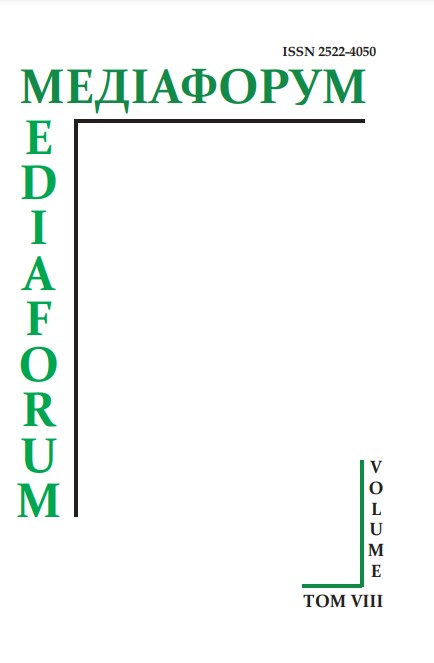Media support and its influence on the results of the referendum in Britain’s exit from the EU
DOI:
https://doi.org/10.31861/mediaforum.2020.8.102-114Keywords:
UK, Brexit, media, referendum, EU, migrationAbstract
June 2016 was marked by a landmark event - the so-called Brexit (literally from Britain’s exit ) – a referendum in which 52% of the population voted for the withdrawal of the United Kingdom from the European Union
and only 48% - against. The significant changes that took place in the UK in the summer of 2016, finally split British society into those who are for and against leaving the European Union.
The British media acted as a platform for political debates and discussions on the key issue of Britain’s stay in the EU. The most powerful media conglomerate, of course, had a decisive influence on the mood of those who voted, intensifying social polarization, which was reflected in the results of the fateful referendum.
Elements of the British media played a key role in the debate over the referendum on the country’s membership in the European Union. The exit vote was influenced by a long campaign against the EU and against migration from EU countries. Throughout the campaign, virtually all media are in flagrant violation of journalistic standards of objectivity, fairness, and accuracy, becoming essentially propaganda bodies.
The relevance of the study is due to the fundamental changes in British society related to the Brexit process, as well as the importance for politicians and the public of understanding public opinion and the media about Brexit. In addition, it is important to see how the view of Brexit has changed. It is necessary to find out the benefits, priorities and understanding of different scenarios, the driving forces behind these attitudes, and whether they change in response to statements and remarks by politicians and public figures. Britain’s withdrawal from the European Union is important for the whole world, as it affects the changing geopolitics of the whole of Europe. This topic is important for understanding the study of the political preferences of British society and the British media during the Brexit process.
It can be stated unequivocally that both Brexit and the subsequent US election campaign in 2016 showed another example of skillful speculation in facts and figures, the successful creation and dissemination of unverified “viral information” through the media, which in the era of telecommunications has become a particularly effective tool for manipulation of public sentiment.
The example of Brexit has demonstrated how to take the success of such campaigns to a new level, using all types of media (from traditional to electronic, including social networks), through which you can introduce into society binary oppositions that divide it, to introduce into the information space certain political figures, to popularize the necessary moods and slogans, to simplify the political process to the level of a show.
Downloads
References
Public opinion in the European Union. First results. May 2013. – European Commission. Standard. Eurobarometer. No. 79. Spring 2013. P. 9. http://ec.europa/eu/public opinion/index.eu.htm (accessed October 16, 2020).
Traynor I. Crisis for Europe as trust hits record low. – The Guardian. 24.04.2013. https://www.the-guardian.com/world/2013/apr/24/trust-eu-falls-record-low (accessed October 16, 2020).
Berry M. Understanding the role of the mass media in the EU Referendum. EU Referendum Analysis 2016: Media, Voters and the Campaign / ed. by D. Jackson, E. Thorsen, D. Wring. Poole, 2016. http://www.referendumanalysis.eu/eu-referendum-analysis-2016/section-1-context/understanding-the-role-of-the-mass-media-in-the-eureferendum (accessed October 16, 2020).
Lambert H. EU Referendum result: 7 graphs that explain how Brexit won The Independent. 2016. 24 June. http://www.independent.co.uk/news/uk/politics/eu-referendum-result-7-graphs-that-explainhow-brexit-woneu-explained-a7101676.html (accessed October 16, 2020).
EU Referendum «How Did You Vote» Poll http://lordashcroftpolls. com/wp-content/uploads/2016/06/How-the-UK-voted-Full-tables-1.pdf (accessed October 15, 2020).
Britain’s Daily Mail backs «Leave» in EU referendum https://fr.reuters.com/article/us-britain-eu-media-idUSKCN0Z730L (accessed October 16, 2020).
We urge our readers to beLEAVE in Britain and vote to quit the EU on June 23 https://www.thesun.co.uk/news/1277920/we-urge-ourreaders-to-believe-in-britain-and-vote-to-leave-the-eu-in-referendumon-june-23/ (accessed October 15, 2020).
Migrants pay just £100 to invade Britain. https://www.pressreader.com/uk/daily-express/20160601/281479275668767 (accessed October 15, 2020).
,000 migrants ready to sneak into Britain https://inforrm.org/2016/07/06/brexit-and-the-newspapers-where-was-ipso-hacked-off/ (accessed October 17, 2020).
Migrant crisis will cost £20bn: Experts reveal shock price the EU has to pay. https://www.express.co.uk/news/world/678878/migrant-crisiscost-20bn-experts-reveal-shock-price-EU-pay (accessed October 16, 2020).
New EU tax raid on Britain: Staying in could cost each household another £2,600. https://www.express.co.uk/news/uk/681357/EU-tax-Britain-Staying-cost-household-referendum (accessed October 15, 2020).
EU killers and rapists we’ve failed to deport: UK’s inability to expel thousands of foreign criminals undermines case for the EU, say MPs. https://www.dailymail.co.uk/news/article-3622924/EU-killers-rapistsve-failed-deport-UK-s-inability-expel-thousands-foreign-criminalsundermines-case-EU-say-MPs.html (accessed October 20, 2020).
What a way to tackle the migrant crisis! EU plans to control the influx by inviting MORE from Africa and the Middle East in bid to curb illegal migration. https://www.dailymail.co.uk/news/article-3630383/What-way-tackle-migrant-crisis-EU-plans-control-influx-inviting-Africa-Middle-East-bid-curb-illegal-migration.html (accessed October
, 2020).
Brexit poll boost as migration fears grow: Out camp takes SEVEN-POINT lead amid warnings of UK population surge. https://www.dailymail.co.uk/news/article-3639963/Brexit-poll-boost-migration-fearsgrow-camp-takes-seven-point-lead-amid-warnings-UK-populationsurge.html (accessed October 18, 2020).
«We’re from Europe – let us in!» https://infacts.org/wp-content/uploads/2016/06/image-1-e1466163500610-768x1024.jpeg (accessed October 18, 2020).
Immigrants should be forced to learn English, says Boris Johnson as he insists he is ‘proud’ of his gaffes. https://www.telegraph.co.uk/politics/2019/07/05/immigrants-should-forced-learn-english-says-borisjohnson-insists/ (accessed October 18, 2020).
EU referendum: Security minister says Britain better placed to fight terrorists outside EU. https://www.telegraph.co.uk/news/2016/06/09/brexit-referendum-security-minister-says-britain-better-placed-t/ (accessed October 19, 2020).
Cameron’s migration deception: PM knew FOUR years ago he’d never meet immigration target while inside the EU, reveals former closest aide. https://www.dailymail.co.uk/news/article-3651434/Cameron-s-migration-deception-PM-knew-FOUR-years-ago-s-never-meet-immigrationtarget-inside-EU-reveals-former-closest-aide.html (accessed October 22, 2020).
Daily Mail publishes correction to story about “migrants from Europe». https://www.theguardian.com/media/2016/jun/17/daily-mailpublishes-correction-story-migrants-from-europe (accessed October 23, 2020).
Denham J. How English identity politics will shape the 2017 general election. http://www.newstatesman.com/politics/june2017/2017/04/howenglish-identity-politics-will-shape-2017-general-election (accessed October 25, 2020).














